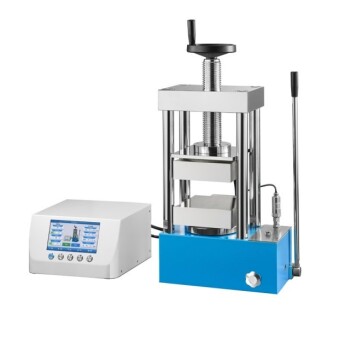In essence, AI acts as an intelligent co-pilot for the modern researcher. It fundamentally enhances laboratory experimentation not by replacing physical tests, but by making them drastically more efficient. AI models analyze existing data to predict outcomes, identify the most promising variables to test, and intelligently guide the entire research workflow, saving immense time and resources.
The core value of AI in the lab is not the elimination of experimentation, but its optimization. It transforms the scientific method from a process of brute-force trial and error into one of intelligent, targeted inquiry, ensuring that bench time is spent on the experiments most likely to yield a breakthrough.

From Brute Force to Intelligent Design
The traditional experimental process often involves testing a vast number of variables, a slow and resource-intensive approach. AI introduces a predictive layer that refines this entire workflow.
The Traditional Experimental Challenge
Historically, discovering a new material or optimizing a chemical process required manually testing countless combinations of temperatures, concentrations, and catalysts. This is a fundamentally inefficient process where the majority of experiments do not lead to the desired outcome.
AI's Role: Predictive Modeling
AI leverages existing experimental data—both successes and failures—to build a predictive model. This model learns the complex relationships between input parameters and experimental outcomes, allowing it to forecast the results of experiments that have not yet been performed.
Optimizing the Parameter Space
Instead of testing thousands of possibilities, a researcher can use an AI model to identify a small, high-potential subset of conditions. The AI effectively narrows the "parameter space," pointing scientists directly toward the most promising areas for physical validation.
Accelerating the Research & Development Cycle
The primary impact of this optimization is a dramatic acceleration of the entire R&D lifecycle, from initial hypothesis to final discovery.
Shortening the Design-Build-Test-Learn Loop
The cycle of designing an experiment, running it, analyzing the results, and learning for the next iteration is the engine of science. AI automates the analysis and learning phases, suggesting the next optimal experiment almost instantly and compressing a cycle that once took weeks into a matter of days or even hours.
Identifying Novel Research Directions
By analyzing vast datasets of past experiments, patents, and scientific literature, AI can identify non-obvious patterns and correlations that a human researcher might miss. This can spark entirely new hypotheses and open up unexplored avenues of inquiry that would have otherwise been overlooked.
Understanding the Foundational Hurdles
Implementing AI is not a simple plug-and-play solution. Its effectiveness is entirely dependent on the quality and structure of your data.
The "Garbage In, Garbage Out" Problem
AI models are only as good as the data they are trained on. Success hinges on having access to clean, high-quality experimental data. If the input data is messy, incomplete, or unstructured, the model's predictions will be unreliable.
The Challenge of Standardization
Labs often suffer from a lack of data standardization. Inconsistent units of measurement, varying naming conventions for chemicals, and different data file formats prevent AI from effectively aggregating and learning from historical information.
System Interoperability
A truly efficient, AI-driven workflow requires that different laboratory systems can communicate seamlessly. If your laboratory information management system (LIMS), analytical instruments, and data analysis software are isolated silos, you cannot build the automated feedback loop that makes AI so powerful.
Making the Right Choice for Your Goal
Adopting AI is not an all-or-nothing proposition; success comes from a targeted, strategic implementation that aligns with your specific objectives.
- If your primary focus is accelerating discovery: Begin by using AI for literature analysis and hypothesis generation to identify novel research paths within existing public and internal data.
- If your primary focus is process optimization: Concentrate on using AI to model and narrow the parameter space for a single, well-understood, and data-rich experimental process.
- If your primary focus is building a long-term capability: Prioritize your data infrastructure first by standardizing data capture and ensuring your lab systems are interoperable before attempting to deploy complex models.
By treating AI as a tool to augment human intellect, not replace it, you unlock a more efficient and insightful future for scientific experimentation.
Summary Table:
| Aspect | AI Enhancement |
|---|---|
| Experimental Design | Uses predictive models to identify high-potential variables, reducing trial and error |
| R&D Cycle | Accelerates design-build-test-learn loops, shortening timelines from weeks to hours |
| Data Utilization | Analyzes existing data to uncover patterns and suggest novel research directions |
| Implementation Focus | Targets specific goals like discovery acceleration or process optimization |
Ready to supercharge your lab with AI-driven efficiency? KINTEK specializes in lab press machines, including automatic lab presses, isostatic presses, and heated lab presses, designed to integrate seamlessly with AI workflows for faster, more reliable results. Contact us today to discuss how our solutions can optimize your experimentation and boost productivity!
Visual Guide

Related Products
- Laboratory Hydraulic Press 2T Lab Pellet Press for KBR FTIR
- Laboratory Hydraulic Press Lab Pellet Press Button Battery Press
- Manual Heated Hydraulic Lab Press with Integrated Hot Plates Hydraulic Press Machine
- Manual Laboratory Hydraulic Press Lab Pellet Press
- Automatic Laboratory Hydraulic Press Lab Pellet Press Machine
People Also Ask
- How are hydraulic presses used in spectroscopy and compositional determination? Enhance Accuracy in FTIR and XRF Analysis
- Why is sample uniformity critical when using a laboratory hydraulic press for humic acid KBr pellets? Achieve FTIR Accuracy
- What are some laboratory applications of hydraulic presses? Boost Precision in Sample Prep and Testing
- How do hydraulic press machines ensure precision and consistency in pressure application? Achieve Reliable Force Control for Your Lab
- What is the role of a hydraulic press in KBr pellet preparation for FTIR? Achieve High-Resolution Chemical Insights



















